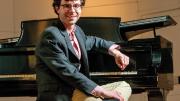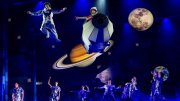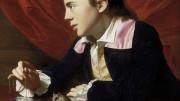Matthew Aucoin ’12 is unsparing toward his past work, especially the operas. Half-kidding, he claims, “I’d love to just burn all of it.” He has youthful assurance that he’ll write more and better pieces, but also more fuel for the flames than most people his age: he’s composed music since childhood, and his pieces have been performed in venues from Zurich to Salem, Massachusetts; he’s also conducted orchestras across America and in Europe.
Already he knows his creative rhythms: “I compose in the morning, and I go until I’m dry.” He tries to write every day, and always at the piano. “I find that if I’m engaging physically with this box, this hunk of wood and metal, it pushes back at me. If I’m just sitting at my desk composing, I’m doing what I want rather than what the music wants,” Aucoin explains. “I don’t think I would be able to honestly discover a new space without engaging physically.”
Within a single conversation, he will alternate between describing music as something to “wrestle” with, and as something elusive, even delicate, vulnerable to injury through carelessness. Casually defying the old truism “Writing about music is like dancing about architecture,” he would reject its premise that the world of literature and the world of sound are essentially separate. At Harvard, Aucoin concentrated in English and wrote a creative thesis in poetry, while maintaining an active presence on the extracurricular music scene. Afterward, he matriculated in Juilliard’s composition program, but was by his own estimate “a derelict grad student.” Opportunities beckoned beyond the classroom—assistant conducting at the Metropolitan Opera and the Rome Opera, an apprenticeship with the Chicago Symphony Orchestra—and so, feeling confined by conservatory culture after four years of the liberal arts, he says, “I ran away screaming.” (He still managed to complete a graduate diploma.)
Composing opera allows him to pursue both language and sound, but he takes them one at a time. Aucoin always starts with the libretto: “I want to approach it as a stranger, who slowly becomes intimate with how the language works.” He hopes to upend a few commonly held beliefs—that English is a bad language for opera; that lyrics should act as “the subservient wife” to music—and cites the example of W.H. Auden and Igor Stravinsky’s The Rake’s Progress. In it, he says, “There are two rhythms, and two kinds of music, wrestling at every moment. A lesser composer might have said, ‘Give me something sweet, and flowing, and easy,’ and that’s what a lesser poet would have done. And a lesser composer would have done what the words want.”
Aucoin has been drawn to American poets as operatic subjects: in Hart Crane, the protagonist duets with his lover on the Brooklyn Bridge; in the one-act From Sandover, James Merrill and his partner listen to a ghostly voice through a Ouija board. The American Repertory Theater will premiere Crossing, about Walt Whitman, at Boston’s Shubert Theatre in May. During a Harvard lecture and recital to introduce the work, Aucoin spoke of how, in his senior year, “I was very much in love with someone. Worried that my feelings would be unrequited, I came to see music as unrequitable love, and to see that it gains power by its very unrequitability.” His opera imagines Whitman in the midst of a midlife crisis, writing mostly journal entries or letters on behalf of soldiers, as he serves as a nurse at a Union hospital. The lyrics borrow from his poetry only in snippets—a bit from “The Sleepers,” a verse from “Crossing Brooklyn Ferry” at the show’s climax—and Aucoin’s restless melodic line makes the familiar words unfold anew. They don’t feel preordained, but like thoughts in open search of answers.
Aucoin counts himself lucky to have received a steady stream of commissions thus far. Classical-music institutions are known to be conservative, leaning on tried-and-true repertory rather than seeking out the work of living composers. “If you’re working in the classical tradition, it’s like you’re born rich,” he says. “Your great-great-great-great-grandparents came on the Mayflower. You’re that kid. You don’t need to work. If you’re an administrator born today, you can get fat off Tchaikovsky forever. So the question becomes, is that any way to live? Do you really feel 100 percent alive that way? Take a chance!” he urges, and points out that on Broadway—or, for that matter, at Venice’s Teatro La Fenice in the nineteenth century—a single season might produce many forgettable flops, but also La Traviata. “How do we expect people to make great work if the condition of every new work is that it must be great?” he asks. “Of course it’ll be bad sometimes. It’s supposed to be.”
Enough have taken a chance on him—Boston’s Gramercy Trio, San Antonio’s SOLI Chamber Ensemble, the Metropolitan Opera’s New Works program, the composing residency at Dumbarton Oaks—that Aucoin feels able to take one himself. Introduced to conducting in college, he’d found it was “a total narcotic experience. I got into it so fast that it precipitated a quarter-life crisis”—he knew it was steadier, better-compensated work than composition. Though he says, “I’d go slightly crazy if I did only one or the other,” he can now accept fewer orchestra gigs, and allow himself unbroken time to sit at his piano and write.
That narrative of risk and discovery runs through his recent pieces. In Crossing, Whitman’s intimacy with a wounded Confederate soldier in disguise is electrified by the possibility, or threat, of romance. Second Nature, a one-act children’s opera premiering in Chicago this summer, also has heroes who dare to venture beyond what’s safe. (Asked if he changed his style for younger listeners, Aucoin remarks, “I think kids are more musically open than many opera audiences—they’re less likely to complain that I don’t sound like Puccini.”)
Set on a wrecked Earth where humans live in zoo-like protective enclosures, Second Nature tells a dystopian fairy tale in which two children meet a monkey who’s been growing a real, illegal fruit tree. Aucoin calls it a “reverse Garden of Eden” story: “Biting the apple is what saves you.” Fitting for a composer at the start of his career, these songs of innocence and experience relish the first taste of fresh fruit, and how it instills a restless urge to explore.









